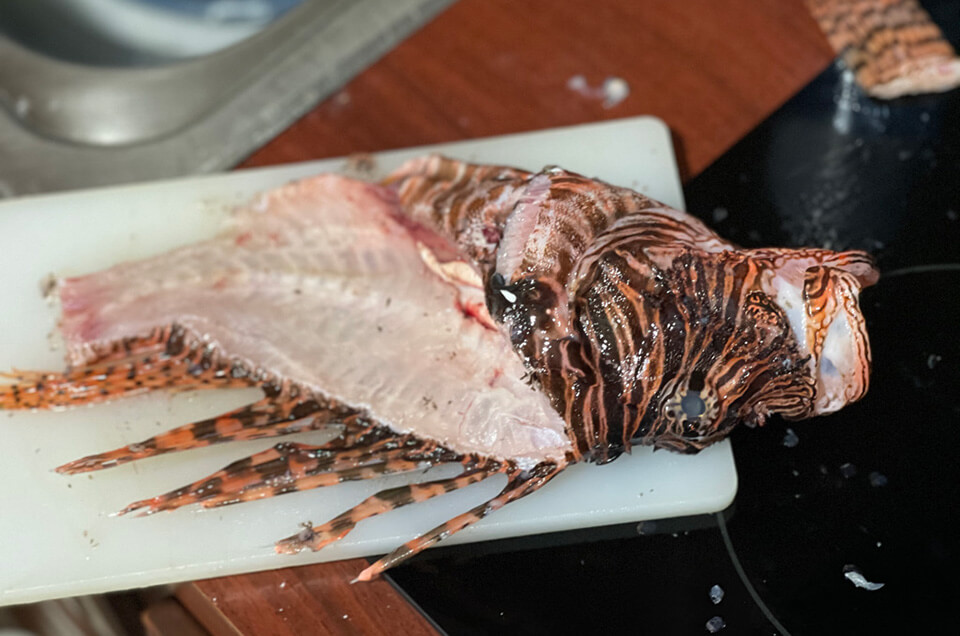Can Lionfish Be Eaten by Humans?

The short answer to whether lionfish can be eaten by humans is yes. At Lionfishdivers.com, we are enthusiastic about eating and cooking lionfish and letting people know that lionfish is delicious. It makes sense that people ask this question, however, because most are unfamiliar with this non-native, invasive species. Lionfish have spread throughout the Caribbean and Atlantic Oceans, and they are damaging our underwater environment.
At Lionfishdivers.com, we are dedicated to educating the public about how to stop this invasion through activities that include hunting, cooking, and eating lionfish. Here, we discuss whether lionfish can be consumed by humans.
Are Lionfish Edible?
These prolific whitefish are more than edible, they are well suited to a variety of tasty preparations. Celebrity chefs, such as Jose Andres, are encouraging us to eat more lionfish – and for good reasons. More firm than mahi mahi, lionfish yields a lean, flaky flesh successfully used in making ceviche, as well as in baking, frying, steaming, and blackening.
Consumer demand for cooking and eating lionfish encourages divers to hunt and harvest them, and restaurant chefs to put them on their menus. This makes for happy divers, satisfied diners, and a healthier ocean environment for native fish populations in the Atlantic and Caribbean. With less predation by lionfish, native species can better survive and thrive, including shrimp, lobster, grouper, and snapper.
Those familiar with this fish species from home aquariums or diving holidays may be put off by the beautiful, but venomous, spines that adorn Lionfish dorsal fins. These spines can cause painful stings, and unless you are engaged in hunting lionfish, they are best avoided. However, for divers armed with the proper equipment, Lionfish hunting is a fun, rewarding activity. This can be an excellent focus for vacations in Caribbean locations, such as Aruba and Cancun. Scuba divers along the Atlantic seaboard, including, Hoboken, New Jersey, and Destin, Florida, also find these trips to be worthwhile and delicious. Hunters can enjoy cooking and eating lionfish, as well as helping create an ocean environment that is safer for a diversity of sea life.
What Do Lionfish Taste Like?
Wherever lionfish are hunted, cooks are developing new combinations and incorporating this versatile whitefish into existing recipes. So, what does lionfish really taste like? It is a good-tasting, flaky, firm fish that can be grilled, fried, and baked. The fish is described as pleasant tasting and flavorful. It is not an oily fish, like salmon or bluefish, so the texture is light and dry. Some diners describe it as similar to shrimp or lobster in taste, while others use the term buttery. Whether you marinate it in citrus juices for a Mexican-style ceviche or prepare a fried platter for dipping in tartar sauce, lionfish is an excellent ingredient.
Is Lionfish Kosher?
The lionfish has fins and scales, so it is considered to be a kosher species of fish. This is good news for fish fanciers who keep kosher. Flaked fish can be made into crisp cakes, filets can be fried in oil, or rubbed with favorite spices before placing them on the grill. Lionfish can be enjoyed as an ingredient in tacos, baked with a tomato sauce, or grace a fresh green salad.
Is Lionfish Good to Eat?
The venomous spines of the lionfish cause concern among would-be diners. But they have nothing to worry about. Once the fish has been safely cleaned and the spines have been removed, the fish is safe to eat. More than that, lionfish is high in Omega-3 fatty acids and low in heavy metal concentrations. This helps create a meal that is safe, delicious, and healthy.
Divers and cooks can easily learn how to clean lionfish. Care should always be taken to protect the hands with gloves, and use tools that protect from contact with the spines. The venom is only harmful if it is injected. What’s more, cooking deactivates the venom, so after the meat of the lionfish is prepared, there is no danger associated with the venomous spines.
Is There a Cure for Lionfish Venom?
There is no danger from lionfish venom if the fish has been cleaned and cooked for your dining pleasure. But you must be careful when hunting and cleaning the lionfish. Lionfishdivers.com provides education and information about lionfish hunting, cleaning, cooking, and eating.
If people are injected with lionfish venom, they can develop severe pain and blisters in the area. This venom can cause swelling, tenderness, redness, sweating, and muscle weakness, and can even lead to paralysis in some cases. Lionfish have 18 of these dangerous spines, concentrated in the top dorsal fin, but there are also one spine on each side in the pelvic fin and three spines located in the anal fin. Rather than finding out what it is like to get stung by a lionfish, always be prepared with protective equipment and tools.
According to Poison Control advice, most lionfish stings can be managed at home if tetanus immunization is up to date. Using tweezers to remove the spine, washing the area with soap and water, and soaking the area in hot water are recommended. In addition, the victim may want to use an over-the-counter pain medication. However, as with most stings and venoms, watch for allergic reactions, such as anaphylactic shock, severe muscle cramps, the development of pus, or feeling faint. If it is not clear whether all the spines have been removed, an X-ray may be indicated.
Types of Lionfish Recipes
When you are ready to cook lionfish, you are in for a treat. Most people have a favorite fish recipe, depending on the season or type of fish. But lionfish are so adaptable, you can substitute them in almost any recipe.
One of our favorite environmentalists, Steff McDermot of the Grand Cayman Islands, shared her favorite lionfish recipe with us. She cuts cubed, skinned lionfish filets and mixes them with freshly squeezed lime juice. This process of soaking in citrus juice prepares the raw fish for eating within a few minutes. Add red onion and cilantro. She also adds mango chunks. Tomatoes and other vegetables or fruits might also be added to this ceviche.
Lionfish can be prepared in sushi rolls, and also lightly fried with tempura coatings for eating with rice and seaweed salads. Aficionados of classic French dishes might enjoy lionfish Meunier, where the filets are sauteed with butter and finished with a white wine sauce.
Almost everyone loves a fish fry, and lionfish excel in this preparation. The spineless wings of the fish can be fried right along with the battered fish to make a crispy accompaniment, similar to potato chips. And for those who don’t enjoy fried fish, broiled and grilled preparations offer opportunities to season this lovely, adaptable fish for a variety of ethnic cuisines, including Cajun, Goan, Thai, and Indonesian spice mixtures.
Discover More Information and Recipes for Lionfish
Explore a new taste and help the environment, by choosing lionfish from restaurant menus, and encouraging others to do the same. Whether you are a diver interested in the fun sport of hunting lionfish, or a cook who loves to experiment with fish recipes, Lionfishdivers.com offers advice and information about invasive lionfish populations in the Atlantic and Caribbean. Find the answers to your questions at Lionfishdivers.com.





